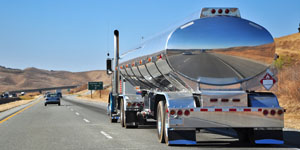More information about tanker hauling
Tanker equipment is designed for hauling various types of liquids and gases ranging from water to gasoline to hydrogen or other chemicals. Tankers include trailer used exclusively for the purpose of hauling liquids and flatbed trailers with tanks secured to the trailer. Tanker drivers are often hired by gasoline or other fuel companies as well as chemical companies. Less hazardous materials hauled in tanker equipment may include water or milk.
As many tankers carry hazardous or flammable materials, the level of liability for carriers hauling tanker equipment is high. Likewise, offloading the liquids or gases hauled requires special skills. With those factors in mind, individual companies producing products hauled in tankers will own a fleet of equipment and hire drivers well-trained in the skills needed.
A tanker driver must accept an extremely high level of responsibility and exercise equally extreme caution when hauling and offloading liquids or gases. Some chemical hauled in tankers can be environmentally hazardous if released, and other may be deadly - sometime for a considerable distance and requiring evacuations of neighborhoods or business districts. The liability a driver and employer hold when hauling and offloading hazardous materials requires high levels of insurance as well as high premiums. Tanker drivers are not going to be hired if inexperienced or with records of questionable driving behavior.
Tanker drivers must also be detailed in record-keeping. Reading gauges as materials is loaded, hauled, and offloading is important to know how much of a tank’s capacity is delivered to what locations and if gauges indicate leaks. Hazardous material transportation laws can be very strict and it is up to the driver to ensure compliance at all times.
Tanker drivers are required to hold the (N) Tanker endorsement, and it is advised to obtain the (H) Hazardous Materials endorsement or (X) Hazardous Material-Tanker combination endorsement. With the endorsement tanker drivers will be limited in the liquids they can haul.
While tanker drivers may be paid by the mile or salaried, they command some of the highest wages in the trucking industry due to the level of responsibility and personal danger involved with their work.
Job search faqs
jobs.thetrucker.com is one of the leading sources for truck driving and diesel mechanic job listings, and its primary objective is to connect professional drivers and mechanics with jobs. jobs.thetrucker.com’s job search functionality is designed to be simple and easy to use, and allows you to search for jobs by state, by carrier and various other search criteria.
Once you apply for a job, we match your qualifications to the appropriate job listings and send your application to the hiring companies immediately.
jobs.thetrucker.com’s job search functionality is designed to be simple and easy to use, and allows truck drivers and diesel mechanics to search for jobs by state, by carrier and various other search criteria. When searching for jobs, you may set the search criteria to be as specific or general as you want to find the job that is best for you.
jobs.thetrucker.com adds and updates job listings immediately as new truck driving and diesel mechanic job listings are received. So it is best to visit jobs.thetrucker.com regularly for updated job listings when in the market for a new truck driving or diesel mechanic job.
No! Drivers and mechanics may access job listings, job resources and submit job applications on jobs.thetrucker.com free of charge using their phone, desktop or any other device.
Yes! We encourage you to apply for all jobs that you have an interest and that match your qualifications. Applying for multiple jobs increases your chances of finding the best job for you.
After you have submitted your application on jobs.thetrucker.com, you will receive an email confirmation that your application has been received.
If you do not receive this confirmation email, please check your spam or junk folder. If you determined you did not receive the email confirmation, please Contact Us.
jobs.thetrucker.com processes job applications immediately and automatically sends driver and mechanic applications to the hiring company once we confirm your qualifications meet the job requirements.
Companies' response time may vary based on the urgency of their hiring needs, the number applications the comppany receives and the resources dedicated to processing applications. Applicants increase their chances of being contacted by applying to all jobs that meet their qualifications.
Carrier may or may not respond to all applications depending on their hiring policies, procedures and driver needs. And, it is possible that a carrier will not respond to applicants if their experience does not match the hiring requirements. Applicants will increase their chances of being contacted by carriers by applying to all jobs that meet their qualifications.
Along with all truck driving and diesel mechanic job listings, jobs.thetrucker.com provides information about all carriers offering jobs in the carrier’s information page. Each carrier’s information page is accessible from the each individual job listing, and from the "Carriers List" in the "Resource" drop down.
A commercial driver license (CDL) is a license required to operate large, heavy, or hazardous material vehicles in the US. The class of CDL a truck driver depends on the type of commercial motor vehicle operated. A truck driver may hold a CDL in one of three classes: Class A, Class B, and Class C.
Driver Type refers to the employment arrangement a driver operates. The most common truck driver arrangements include:
- Company Driver: Drivers employed by a specific carrier with its own fleet of trucks. Companies can be carriers that contract to transport freight, or companies that carry their own freight.
- Lease-Purchase: Drivers hired by carriers where the truck is leased to the individual driver.
- Owner Operator (OO): Drivers who own the truck and operate as an independent business (also referred to as an "independent contractor").
- Team Driver: Drivers operating with a partner who shares driving duties.
Hauling Type (or trailer type, or equipment type) refers to the type of cargo being hauled. Different types of cargo materials require different types of trailers, and each type of trailer requires unique driver experience.
Endorsements are required certifications for CDL holders hauling various types of equipment and freight. The most common endorsements for long haul truck drivers include:
- Doubles/Triples: required for drivers hauling double or triple trailers.
- HazMat: required for transporting hazardous materials.
- Tanker: required for operating a vehicles designed with a permanent or temporary tank attached.
The information you provide when submitting a job application is secured by an encrypted SSL security certificate because the privacy of your personal information is important to us. See our Privacy Policy and Terms of Service.
Finding the right diesel mechanic job requires careful consideration of various factors. Research potential employers’ reputation and culture, evaluate compensation packages, and confirm that long-term growth and advancement opportunities fit with your career goals. Other factors to consider include: your own level of experience, skill and industry specialization vs the job requirements; CDL license requirements; tool requirements; location; training and professional development opportunity; work schedule, flexibility and work-life balance. For key considerations for finding a job as a heavy-duty truck diesel mechanic or technician, visit our Diesel Mechanic Job Resources.
Diesel mechanic certifications represent an industry recognized level of knowledge and expertise in a particular area of diesel engine diagnosis, repair or maintenance. These advanced certifications are offered by the National Institute for Automotive Service Excellence (ASE) and enhance a mechanic’s skill set and positively impact their qualifications and salary. Certifications may be obtained in specific areas such as gasoline and diesel engines, drive trains, brakes, suspension and steering, electronics, HVAC and preventative maintenance. For a listing of ASE certifications available specifically for heavy-duty truck mechanics, visit our Diesel Mechanic Job Resources.



